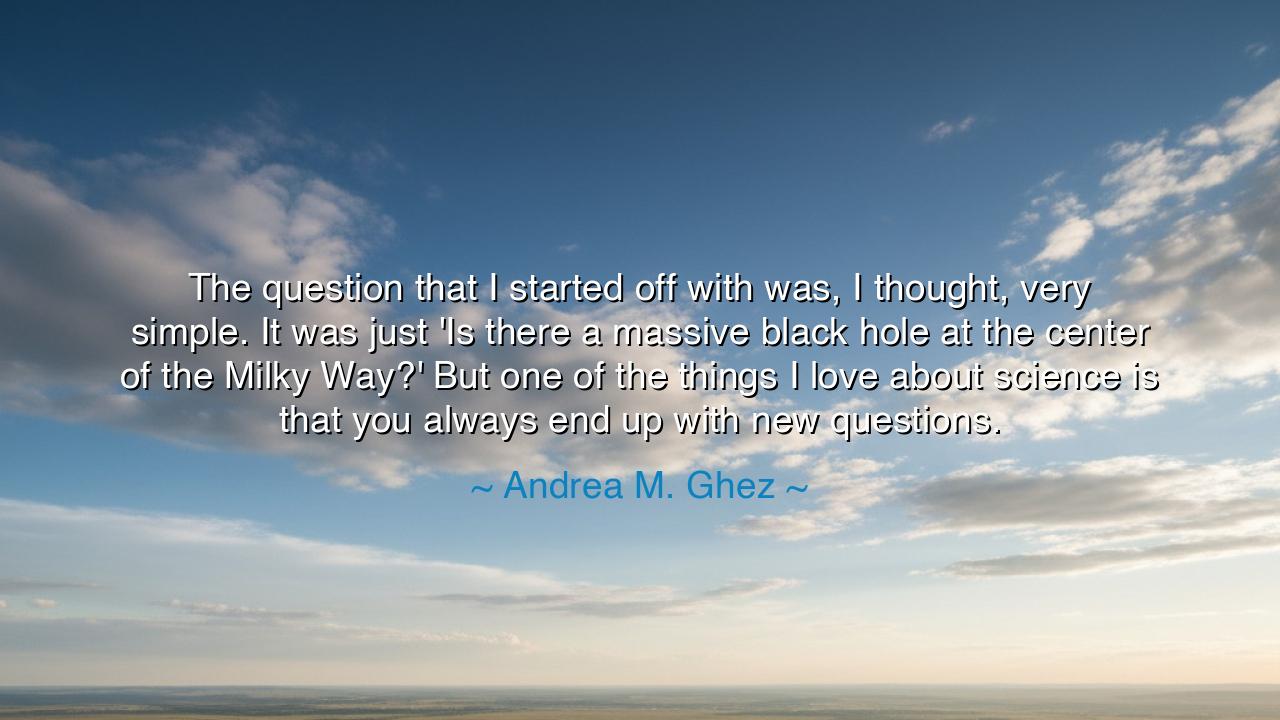
The question that I started off with was, I thought, very simple.
The question that I started off with was, I thought, very simple. It was just 'Is there a massive black hole at the center of the Milky Way?' But one of the things I love about science is that you always end up with new questions.






Hear, O seekers of wisdom, the words of Andrea M. Ghez, who spoke of the unending journey of discovery in science: "The question that I started off with was, I thought, very simple. It was just 'Is there a massive black hole at the center of the Milky Way?' But one of the things I love about science is that you always end up with new questions." These words reveal the very nature of science—a never-ending quest, one that begins with a simple question and, through relentless curiosity, leads to a deeper understanding and yet more questions. In this process, each discovery is but a stepping stone to the next, and the search for truth never truly ends. It is not just about finding answers, but about exploring the unknown, embracing the mysteries that lie hidden, and seeking knowledge with an unquenchable thirst.
In the ancient world, the greatest philosophers and scientists were also driven by questions—questions that arose not from the answers they already had, but from the deep mysteries they sought to understand. Socrates, the great philosopher, famously said, "The only true wisdom is in knowing you know nothing." His pursuit of truth was based on the recognition that each answer he uncovered only opened the door to more questions, for the nature of knowledge is infinite. Just as Socrates asked fundamental questions about the human soul and the nature of virtue, so too did Ghez’s question about the black hole in the heart of the Milky Way begin a journey into deeper unknowns, revealing layers of complexity that could not have been anticipated at the start.
Consider the work of Galileo Galilei, who, in his time, posed questions that would change the course of history. He gazed through a telescope at the stars and planets, asking questions about their movements, and the nature of the heavens. His initial question was simple: What are the stars? But in searching for answers, he discovered the moons of Jupiter, the phases of Venus, and revealed the true nature of the solar system, challenging the very foundation of earth-centered cosmology. Galileo’s questions, like those of Ghez, led him to places where he could not have imagined, uncovering not only answers, but new questions that would inspire generations of scientists to come.
Andrea Ghez’s pursuit of a simple question—whether there was a black hole at the center of our galaxy—was part of this grand tradition of scientific inquiry. What began as an investigation into a specific phenomenon led her down a path of discovery that was as much about uncovering the unknown as it was about finding the answers. Through her work, she and her team discovered not only that there was indeed a supermassive black hole at the center of the Milky Way, but also complex behaviors and patterns of stars orbiting it. This discovery opened up new questions about how the black hole affected the surrounding space, about the origin and nature of such celestial bodies, and about the deeper forces that govern the cosmos. Science, in this sense, is not a linear path—it is a spiral, a constant turning, where each answer leads us to deeper and more profound inquiries.
The lesson, O children of time, is clear: the pursuit of knowledge is never about reaching a final answer. The true beauty of science lies in the questions it raises, for those questions drive the search for deeper truths and open the door to new understandings. Just as the ancient philosophers sought wisdom by asking questions and challenging assumptions, so too must we approach life with a spirit of curiosity. In this journey of discovery, each answer is merely a step along the way, and each step leads to further inquiry. The process itself—the willingness to question, to explore, and to never settle for simple answers—is what defines true wisdom.
In your own lives, O seekers, do not be afraid of the questions that arise within you. The world will tell you that you must have all the answers, that certainty is the mark of wisdom. But remember, true wisdom is found not in the finality of answers, but in the pursuit of understanding. Ask the questions that seem simple, for in those simple inquiries lie the seeds of profound discovery. Whether you seek to understand the stars above or the heart of humanity, know that your questions are not obstacles to knowledge, but the very path by which knowledge will come to you.
Rise, O children of time, and let your curiosity guide you. Like Andrea Ghez, let your questions lead you to deeper mysteries, and embrace the unknown with the courage to ask even more questions. Let your lives be a testament to the eternal truth that in the pursuit of knowledge, the questions are as important as the answers. And in this endless search, may you find not only the knowledge you seek, but the joy of discovery, and the wisdom that comes from realizing that the greatest truths are those that lead to new questions, ever unfolding before you like the stars in the night sky.






AAdministratorAdministrator
Welcome, honored guests. Please leave a comment, we will respond soon